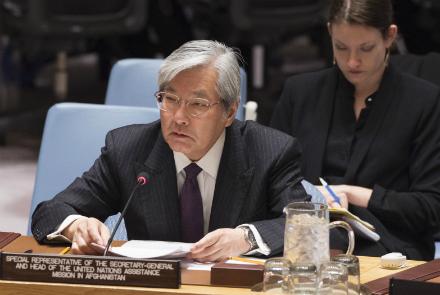UNAMA Chief Tadamichi Yamamoto said at a United Nations Security Council meeting on Afghanistan on Thursday that it was now up to the Taliban to come to the peace talks tables.
He also said political stability requires inclusivity. This was in reference to the rift between ousted Balkh governor Atta Mohammad Noor and the Presidential Palace. He said the issue needs to be resolved through political channels.
On the topic of elections, Yamamoto said the IEC must ensure it gets assistance from government institutions so election can be held as scheduled.
He also said the Independent Election Commission (IEC) has mentioned a possible delay in elections.
Yamamoto also stated that millions of Tazkiras need to be issued ahead of elections so that people can vote.
He welcomed the recent amendments brought to the penal code and said it reinforces Afghanistan’s compliance with Afghanistan human rights and criminal justice.
Talking on civilian casualties, he said 1,200 women were killed or injured last year in the war. “I am concerned by the increase in civilian casualties carried out by ISKP (Daesh),” he added.
Yamamoto said the start of work on the TAPI pipeline project was testimony to successful regional cooperation.
Meanwhile, the Afghanistan High Peace Council (HPC) deputy chairperson Habiba Sarabi who also addressed the meeting, said life for Afghan women has changed considerably in the last 17 years and that this was the result of Afghan women’s efforts and the Afghan Constitution.
Sarabi said Afghanistan passed many laws to protect women and that Afghan women are now involved in government. “At least 242 women prosecutors are serving in Afghanistan. A total of 3,144 women police officers are serving in the Ministry of Interior and this number will rise to 5,000,” she said.
She said women are represented at all levels of the HPC and its leadership. “Peace without meaningful participation of women is impossible.”
However, Sarabi said there are some challenges facing women including domestic violence which still remains a problem, the lack of awareness in rule of law, the lack of higher education, and the lack of election campaign for women.
At the same event, Afghanistan’s Permanent Representative to the United Nations Mahmoud Saikal gave a detailed evaluation of Afghanistan’s situation to the UN Security Council. He stressed the need for eliminating state-sponsored terrorism in the region.
He said Afghan security forces have managed to increase pressure on insurgents following improved support from international partners.
He said the UNSC delegation’s recent visit to Kabul was a clear sign of international support at the highest level.
He also stated that the recent decision including the reduction of financial aid to concerned states represents new attempts to defeat terrorism and he said he hopes this effort continues.
He said the use of an ambulance, in a Kabul bombing that killed over 100 people, in January, was a war crime.
Saikal said the second Kabul Process conference was a major step for peace which is what all Afghans want. “Afghanistan’s peace process is aimed at protecting and expanding people’s rights especially women’s rights.”
Saikal said the debate on state-sponsored terrorism was kept out of international discussions for two decades but that “the time has come that we openly debate the regional state sponsorship exported to our country.”
He said the Kabul process is about ending the conflict, achieving peace and preserving the democratic order for which Afghans have sacrificed their lives.
Saikal said Afghanistan is looking forward to the planned peace meeting in Tashkent.


